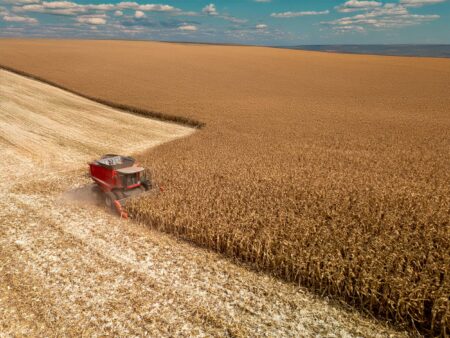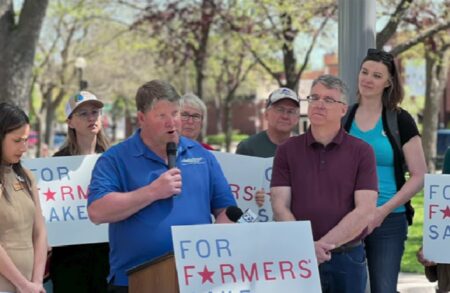The Supreme Court heard arguments this week on President Donald Trump’s use of emergency powers to impose tariffs. Sen. Amy Klobuchar, D-Minn., the top Democrat on the Senate Ag Committee, discussed attending the arguments and why she believes the court will strike down the president’s use of a 1977 law to implement his tariffs. She also outlined what’s needed to end the government shutdown and whether she’ll support farm aid for trade losses this year.
Trade experts Greta Peisch of Wiley Rein and Mayur Patel of Hogan Lovells also weighed in on the case’s implications for agriculture.
Watch the Episode
Want to receive Newsmakers in your inbox every week? Sign up!
Read the Transcript
Please note: This transcript has not been edited.
Lydia Johnson: Welcome to Agri-Pulse Newsmakers, where we aim to take you to the heart of ag policy. I’m your host, Lydia Johnson. Our guest this week is Senator Amy Klobuchar, the ranking member of the Senate Ag committee, who joins us to discuss the Supreme Court’s arguments on President Donald Trump’s tariffs, the government shut down, and farm aid payments this year.
But first, here’s this week’s headlines.
- California will undergo a new redistricting process that’s likely to shift political power for rural agricultural communities in Congress. Proposition 50, a ballot initiative passed by California voters with a safe margin, redraws the state’s congressional districts, making multiple more Democratic-leaning. Proponents cast the measure as a defensive maneuver against aggressive redistricting efforts in Texas and other Republican states. The Cook Political Report immediately shifted its outlook for 11 race ratings in California, moving all but one towards Democrat. Doug LaMalfa, a Republican member of the House Agriculture Committee will be thrown into a much more Democratic district. And David Valadao, a senior member of the House Appropriations Committee, will see his district become more Democratic as well.
- A federal appeals court found the Agriculture Department erred with bioengineered labeling requirements. In a 52-page ruling, the judges said USDA improperly excluded highly refined foods such as corn and soybean oil from labeling regulations for bioengineered food products. The judges also upheld a district court decision that said QR codes and other electronic labeling methods alone were inadequate for the labeling requirements. The lawsuit was filed by Natural Grocers, along with other retailers and groups supportive of GMO labeling requirements.
- The Supreme Court heard oral arguments this week challenging the legality of President Donald Trump’s use of a 1977 law to impose across-the-board tariffs. Multiple Supreme Court justices, including some conservatives, expressed skepticism that Trump can use the International Emergency Economic Powers Act to impose across the board tariffs. Tariffs historically have been a core power of Congress, not the president, Chief Justice John Roberts said.
Senator Amy Klobuchar, ranking member of the Senate committee, was one of several members of Congress in attendance. We asked her why this case is so important for agriculture.
Amy Klobuchar: I can’t think of there’s many things that we need to do with agriculture right now. But for just that horizon over the next year, two years, three years to regain some of these markets and to bring down the cost of inputs, we have to see these tariffs in the rearview mirror and that doesn’t mean that you can’t negotiate them in trade agreements like the Canadian Mexico trade agreement, that you don’t want to have changes. So, I was there, with my farmers in mind and a high-ranking member of the agriculture committee, I’m like, well, maybe if I’m there, we can get some good karma going. It was kind of it was such an interesting argument for like, law nerds, but also for real life for farmers because, the some of the most conservative justices like Justice Gorsuch, are very good. He, he said, you know what? This is Congress’s power. If you’re going to take taxpayer money. I think his words out of someone’s pockets. It’s Congress that’s supposed to do it. And these tariffs are basically, about taxation. And article one of the Constitution says that Congress’ job. The second thing that was going on with both Justice Roberts and Justice Amy Coney Barrett as well as, many other acts are Elena Kagan, primarily that they raised, was the fact that this statute the president relied on called IEEPA. It sounds happier than it is. That he relied on doesn’t even have the word tariff in it. I think that Justice Kagan at one point said, you know what? You can you know all the words you want in that statue, but there’s one that’s not there. And it was such a broad ranging decision to do across-the-board global tariffs. And then to use this, statute that hadn’t been used before ever in history, for these tariffs. But overall, I felt really good leaving that courtroom. Actually, felt good, you know, that there were judges that were listening to this legal case. And I think it’d be very important for rural America if we got a clean start, when it comes to, like, our marketplaces where we are seeing markets drying up and a negotiation of these tariffs, which doesn’t involve this across-the-board tariff through IEEPA.
Lydia Johnson: Yeah, so I mean, after listening to these arguments yesterday, how do you think that the court will rule on this case?
Amy Klobuchar: Well, I don’t want to take — I, well, okay, so I think, I think they’re going to side with the lower courts. What is that? That was the trade court, which was made up of, by the way, three judges. One was a Trump judge, one was an Obama judge, and one was a Reagan judge. They’re still around. And those three said this wasn’t legal to do, for the president to do. Then it went to the Court of Appeals at District at Columbia. And that was seven four where they agreed with that trade court, and now it is there before the Supreme Court, the highest court of the land, and I’m sure they’re going to be looking at the record from below, which is those other court. Then, they’re going to be looking at the law, and they’re going to have to make a big decision. But I don’t think that Justice Gorsuch could have been clear, in his view, of what the Constitution says.
Lydia Johnson: If Congress doesn’t like, you know, what the president is doing with these tariffs, why doesn’t they, why don’t you claw them back in Congress? I mean, the Constitution gives Congress’s tariff powers.
Amy Klobuchar: I guess my two-words answer to that would be, I wish, because we have actually done it in the Senate. The bill with Canada, I led with Tim Kaine and Rand Paul of that little group of three. And then there was one on Brazil, and then there was one on with which we have a trade surplus, could I add, and they still have this 40% tariff. And then the third one is just a global tariff bill. All of these passed. And a lot of this was — I’m a rural state. Republicans are 4 or 5 Republicans that voted with us on these bills to overturn the tariffs. So that meant that these bills are now headed over to the House. Do I think the president would sign them into law? Not at this moment, but it does show some cracks with the Congress saying, hey, wait a minute. This should be our authority. So, you’ve got the fastest moving track right now. Is this court case? I think it will be decided by the end of the year. Very important, for your viewers to know. Secondly, you’ve got the Congress, which is kind of, you know, methodically now finally doing something about overturning in the Senate. But the House would kind of come back and make a decision. The president, of course. And then just the third would be to keep speaking out in my mind, farmers contacting their elected representatives of either party and telling them the effect that these tariffs are having on them. All of that is going to combine, I hope, into a change of policy with my prediction being the courts leading the way. But then what’s going to happen after that? Will the president use some other statue? And that’s why this communicating with members of Congress is so important.
Lydia Johnson: Most farm state Republicans haven’t pushed back against President Trump’s tariffs, at least, not vocally. We ask Senator Amy Klobuchar, the ranking member on the Senate and committee, if she’s surprised there hasn’t been more pushback, and if Republican members are saying different things about tariffs behind closed doors.
Amy Klobuchar: I would say they are. A lot of them tell us they don’t really like these tariffs. A lot of them are from business backgrounds themselves. They believe in capitalism. But if you believe in capitalism, then you’ve got to believe that our farmers want trade. When 20% of our agricultural products are sold outside of the U.S., that’s a major blow. That’s like a major margin of how you can get by as a farmer, particularly small farmers. So, they are saying that and now’s a moment, because if the court throws these tariffs out in the next month or two, then we’re back at the negotiating table and Congress has to assert itself.
Lydia Johnson: And Republicans like to point out that Trump is prioritizing trade and using these tariffs to cut deals with other countries. But President Biden didn’t sign any new broad free trade agreements during his administration. Was that a mistake? And why didn’t he do more to open new ag markets when Democrats were in power?
Amy Klobuchar: You know, I always thought there were some openings potentially, especially. We already had the USMCA, which President Trump, of course, led and I was the first Democrat on the debate stage in the presidential election, to say I supported that agreement. And there was that one. And, of course, there’s changes we’d like to make on the dairy side, but those should be made within the context of the agreement. Then, the other areas where I think could be ripe, I’m kind of looking now instead of the rearview mirror during three previous presidencies. Some were made, some weren’t. So, you know, I’m hoping that we can. Now, if this court case gets behind us, that we can engage regardless of the president, in, some kind of trade agreement.
Lydia Johnson: And I’d like to pivot. The Trump administration has about $12 billion ready to roll out to farmers who are struggling because of the president’s trade policies. Once the government reopens, will you support this package? And do you think that, you know, $12 billion will be enough to cover those initial losses for farm country?
Amy Klobuchar: You know, I understand farmers need money. And so I haven’t opposed this idea. But what I would like to see is actually a farm bill. And I’m not going to stop. Of course, this from happening. And I understand why it’s necessary and have advocated for help for our farmers. But, you know, after that it would be really good to do a farm bill. I think there’s some changes we need to make from SNAP. Let’s put the shutdown problems aside for one minute and think about that. That was pushed over on the states. And that’s going to be a problem for grocery stores, for the states, for the counties. My state’s counties do it and they just don’t have the funds. So I think you could do a farm bill that takes on things like some rural development issues. Senator Hoeven and I have a bill to increase the loan rate, for our farmers. There’s so many things that we can do. Some things were done in the budget bill this summer. But there’s more that we can do. Given what rural America is facing right now by having a farm bill. So, once the aid is out, I really think we should turn. And I know Senator Boozman is interested in this as well. And looking at a farm bill, but putting together the band, as they say, the old coalition, which is the nutrition, conservation, and our farmers, we’re going to get a better result if we do that.
Lydia Johnson: And you think that that $12 billion is sufficient for this first round of aid?
Amy Klobuchar: My guess is because of these tariffs, who knows. It may not be here. And so that’s going to be for the USDA to look at. But they really need to come to the table on the shutdown. And then we can move on move on from there.
Lydia Johnson: And as I wrap up, I’d like to get your thoughts on that as well. I mean, as the government shutdown continues to drag on, SNAP recipients are not receiving full benefits. Shouldn’t this issue be enough to jump start negotiations? And what was your message to your colleagues during the caucus meeting this morning?
Amy Klobuchar: So I thoroughly believe, and having been through budget impasses before, that, you can never resolve it unless the president comes to the table. We need to have a negotiation with the president and the leaders. And I think we could get this done in literally a day. But they need to come to the table because the focus that we have on these tax credits are huge in rural. 75% of the people on the Affordable Care Act plans, they are all seeing their premiums double or triple. And what we’re trying to do is extend the tax credit to we’re already in place to make it easier for them to afford it. And this isn’t a December thing. It’s not a January thing. That’s why it’s tied in with the budget. It’s a now thing. So, that is what the negotiations are about now. And I hope that the president, who has signaled interestingly, honestly, after the election night, said, you know, our issue was a shutdown. And so, this is a perfect moment, as given that he wrote the Art of the Deal. For him to come to the table and we are ready to negotiate. I’ll be here through the weekend if he’s ready to talk to us.
Lydia Johnson: We’ll be back with more agriculture newsmakers. But first, Parker Litterick looks at China’s past soybean purchases and future commitments in this week’s Ag by the Numbers
Parker Litterick: The White House says China has pledged to continue buying soybeans and volumes similar to recent years, USDA estimates China imported 26 million metric tons of U.S. soybeans in both 2023 and 2024. The white House says China has committed to import at least 25 million tons per year for the next three years. This chart shows prices in U.S. soybean exports from recent years, compared to China’s proposed commitment of at least 25 million tons annually over the next three years. Well, exports have dropped significantly, from $34.2 million in 2020 to $5.9 million in the first half of 2025. China has also agreed to buy 12 million metric tons of soybeans by the end of this year. For Agri-Pulse, I’m Parker Litterick.
Lydia Johnson: Welcome back. Multiple Supreme Court justices expressed skepticism that President Trump can impose across the board tariffs using emergency powers. We’re joined by Mayur Patel with Hogan Lovells and Greta Peisch with Wiley Law on our panel. We’ll begin with you Mayur. What were your takeaways from the oral arguments?
Mayur Patel: I think that it’s going to be a little closer than people give it credit for. I do think that there was clearly skepticism, but I also saw a lot of struggle. I don’t think you can necessarily call how, you know, Justice Barrett or Justice Roberts. I think they’re struggling with some of the issues. And I think, you know, a lot of them were left unanswered. The argument went on for over 2.5 hour, but it was kind of repetitive by hour one because they hadn’t gotten some really important questions answered, like, what about refunds? Is that going to be really disruptive? I think the plaintiffs’ counsel kind of dropped the ball on that question. I think there was a really good answer for that. And he kind of missed a non delegation doctrine. I think there were also a lot of questions that they were struggling with. And also, you know, normally you want to try and rule cases narrowly as possible here. I think there was a tendency to say, okay, if we strike this down, it’s going to placate a lot of other statutes. How should we rule on that? Should we not? And I think that was one of the more interesting takeaways I got of this.
Lydia Johnson: And Greta, I want to get your thoughts. President Trump is the first president to use emergency powers to impose tariffs, and the Constitution gives Congress those tarrifing powers. So, can you explain why using IEEPA is so unique, and why the unprecedented use by President Trump is so controversial?
Greta Peisch: Sure. Well, interestingly, there was one prior use, and the justices talked about this under the trading with the Enemies Act, which is a sort of predecessor statute to IEEPA that President Nixon used to impose statutes back in the 70s. And so there was some wrestling with what to make of that action was also challenged by courts. But it really is an expansion here. And this is why, as Mayur said, the justices were really struggling. You know, they’re the words in the statute do not say, you know, you can tariff under this authority. It says you can regulate imports, you can use licenses or other means, to regulate the importation of products. And what does that mean? And there is a lot of just textual questioning of does that encompass tariffs. How do we think about it in the bigger scheme of the tariff laws that we have.
Lydia Johnson: And Greta, President Trump does have other laws he could use to impose tariffs like section 301, section 232. You know, what kind of impact would that have on his ability to get concessions from other countries?
Greta Peisch: You know, I think the outcome of this case will actually have very little impact on, the stance of other countries trading partners. As you said, there’s other statutes that the president can and has used to impose, tariffs. There’s some even more obscure statutes that haven’t been exercised yet, but that could be considered even if there is a gap in tariff coverage, around countries or products. Our trading partners know that these tools exist, and that’s going to keep them at the table, keep them complying with the agreements that have been put in place because there is that specter of further tariffs down the road.
Lydia Johnson: President Trump’s tariffs have hurt many industries, including agriculture. We asked Mayur Patel with Hogan Lovells if he’s surprised there hasn’t been more pushback from farm state Republicans on the tariffs.
Mayur Patel: I mean, I do think some of the farm state senators are raising concerns about the issues. I do think they’ve been a little bit more quietly than maybe Trump won. But, you know, issues like Argentina importation of beef. Certainly, I think he had members saying pretty clearly, yeah, we have concerns here, soybean purchases. We’re really concerned about this. But there’s also a desire to say, yeah, China is a systemic challenge to the United States, maybe we need to give some time on these issues. You know, with the EU, we’ve had an agricultural trade deficit for a while now. And the view is we haven’t really been making any progress. Do we need to give the president some room to see if we can get a deal out of this? So, I think, you know, you’ve got these competing balances, tensions here. So, we’ll see how that shakes out. I think if we don’t see progress, you know, the next several months, I think the dynamics change. But you know, it is something they’re raising. But they’re also saying, look, we do really have some systemic trade imbalances. How do we address this?
Lydia Johnson: And as we wrap up here Greta, I’m curious, you know, what argument do you think seem to resonate most forcefully with some of the conservative justices? And, you know, if you had to take a gamble, how do you think the court could rule on this case?
Greta Peisch: I think it’s treacherous to gamble. I don’t have a crystal ball. I think that, you know, the that the, the major questions doctrine was. So this is the idea it’s a relatively new, principle that for big policy issues with big economic significance. Congress really has to speak clearly. This is a principle that some of the conservative justices have applied during the last administration and could arguably apply here, right. This is a really big policy choice. And did Congress clearly say to the president, you can do this? You know, that’s an issue, I think, that some of those justices, you know, are really going to have to grapple with.
Lydia Johnson: And Mayur, as we wrap up, we’ll end with you, same question, which arguments do you think resonated most, and how could the court potentially rule?
Mayur Patel: So I think major question is going to be the key of the case. There’s another part which is non-delegation, which says Congress just can’t give this legislative power to another body without any intelligible principle. You need to have conditions on that. And I think some of the conservative justices like that issue. But now over the last few years, when they’ve had these cases, some of the justices have said, you know, I might be willing to do that, but not on this case. And I’ve kind of got the sense at least a couple of justices that maybe not this case. The other thing that I thought, you know, to me, that was kind of interesting was, you know, as Greta said, the President Nixon used this language in a prior statute for tariffs. And the court’s kind of struggling with one hand saying if Congress passes the same law and knows what it’s been used work, you assume that Congress knew that it could be used. The other side of the coin was the court that said that it was okay, also said there were limits on that tariff authority. They said, you know, it can’t be unbounded. There would be circumstances. You would strike it down. Does that part also apply carry over to? So, I think those are kind of be the two things are going to be really struggling with over the next few months.
Lydia Johnson: We’ll be back with more newsmakers. But first, Parker Litterick looks at investments in dairy processing capacity in this week’s Map It Out.
Parker Litterick: U.S. dairy processors are making big investments to keep up with rising demand for milk and dairy products. According to the International Dairy Foods Association, more than $11 billion is being poured into new manufacturing plants across 19 states. New facilities will be dedicated to a wide range of dairy products, including cultured milk, ice cream, butter, whey, cheese powder and more. This map shows the location and product category of new dairy processing facilities. States receiving the highest total investment in dairy manufacturing facilities include New York with $2.8 billion. Texas with 1.5 billion, and Wisconsin with $1.1 billion. While the dairy industry continues to grow in the US, dairy exports are also on the rise to countries including South and Central America, Southeast Asia and the Middle East. EDF estimates U.S. milk production to grow 6.5% by 2030. In order to meet consumer demand for Agri-Pulse I’m Parker Litterick.
Lydia Johnson: Thanks for joining us for another episode of Agri-Pulse Newsmakers. The government remains partially shut down. Join us for a webinar next week to discuss how renewable fuels can improve rural prosperity. You can sign up on agri-pulse.com. Tune in to newsmakers next week and check our website any time for the latest developments on all things food, farm and fuel policy. For Agri-Pulse, I’m Lydia Johnson. Thanks for watching.
Agri-Pulse is a trusted source in Washington, D.C., with the largest editorial team focused on food and farm policy coverage.












